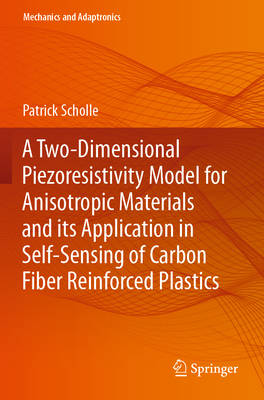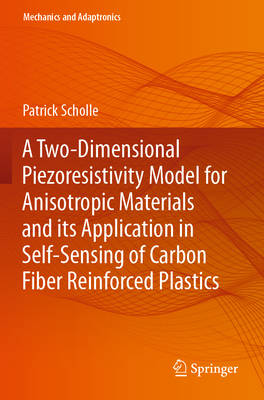
- Retrait gratuit dans votre magasin Club
- 7.000.000 titres dans notre catalogue
- Payer en toute sécurité
- Toujours un magasin près de chez vous
- Retrait gratuit dans votre magasin Club
- 7.000.0000 titres dans notre catalogue
- Payer en toute sécurité
- Toujours un magasin près de chez vous
A Two-Dimensional Piezoresistivity Model for Anisotropic Materials and Its Application in Self-Sensing of Carbon Fiber Reinforced Plastics
Patrick Scholle
158,45 €
+ 316 points
Format
Description
This thesis works on the topic of fiber-reinforced plastics and discusses the measurement of strain with embedded sensors. Embedding sensors into a structure fundamentally poses challenges arising from the differences in mechanical properties of sensor and structure. This thesis works on the research area of Self-Sensing, where these challenges are overcome by using carbon fibers for both load-carrying and strain-sensing functions. Starting with a literature review, this thesis proposes three research hypotheses, which are targeted to describe the Self-Sensing properties of unidirectional carbon fiber reinforced plastics (CFRPs) for strain measurements. These hypotheses assume, that the electric anisotropy of the material results in a complex voltage distribution within a Self-Sensing specimen. In order to discuss this point further, a two-dimensional piezoresistivity model based on the Laplace equation is introduced. The developed model newly allows to quantify the electricpotential changes in specimens with arbitrary geometrical dimensions and electric anisotropy.
Furthermore, this thesis discusses a set of experimental results on the piezoresistive properties of unidirectional CFRP made with the pultrusion process. Overall, the results of the experiments indicate that the most repeatable results are obtained for specimens with electric contacts at their cut-end. This approach allows to manufacture Self-Strain-Sensing rods with a gauge factor of approximately 1.9 that can be used in a multifunctional manner for both load-carrying and strain-sensing purposes. Furthermore, a novel measurement setup is developed, which allows to acquire the electric potential distribution on the surface of electrical conductors with very high spacial resolution. This experimental setup newly reveals that the current flow in specimens can be more complex than assumed in a two-dimensional model.
Furthermore, this thesis discusses a set of experimental results on the piezoresistive properties of unidirectional CFRP made with the pultrusion process. Overall, the results of the experiments indicate that the most repeatable results are obtained for specimens with electric contacts at their cut-end. This approach allows to manufacture Self-Strain-Sensing rods with a gauge factor of approximately 1.9 that can be used in a multifunctional manner for both load-carrying and strain-sensing purposes. Furthermore, a novel measurement setup is developed, which allows to acquire the electric potential distribution on the surface of electrical conductors with very high spacial resolution. This experimental setup newly reveals that the current flow in specimens can be more complex than assumed in a two-dimensional model.
Spécifications
Parties prenantes
- Auteur(s) :
- Editeur:
Contenu
- Nombre de pages :
- 196
- Langue:
- Anglais
- Collection :
Caractéristiques
- EAN:
- 9783031237683
- Date de parution :
- 03-03-24
- Format:
- Livre broché
- Format numérique:
- Trade paperback (VS)
- Dimensions :
- 155 mm x 235 mm
- Poids :
- 368 g

Les avis
Nous publions uniquement les avis qui respectent les conditions requises. Consultez nos conditions pour les avis.






